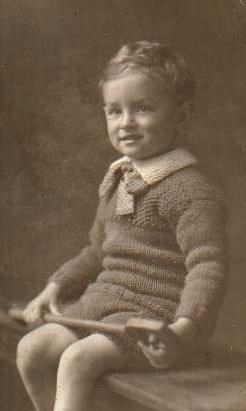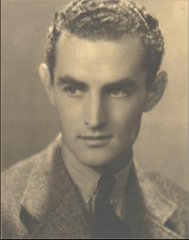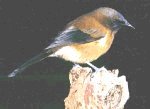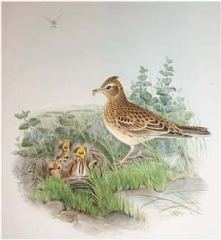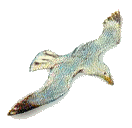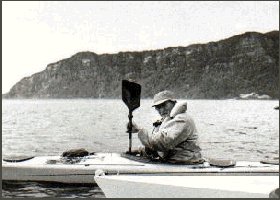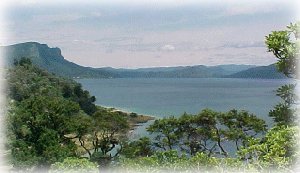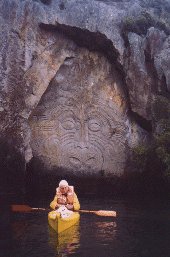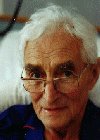St. Patrick's College 207 Fergusson Drive Silverstream, New Zealand
The birds of New Zealand are very wonderful. They are all outstanding, and of many varieties. In the bush, from the distance, come the melodious chimes of the elusive bellbird as it sends forth its carillion-like cry, from the top of a mighty Pohutakawa tree. Beautifully coloured wood pigeons, flit silently through the more open places, or coo softly through the network of creepers which bind most of the lower branches of the forest giants.
From a nearby thicket comes the peculiar cry, of the little known rain bird, as it makes its meal of berries. Out in the open, sparrows, and starlings, fly to and fro in search of food, or straw for their nests.
In the hedges, small and dainty hedge-sparrows, guard their nests and azure blue eggs. By the stream, a blackbird is hopping about in search of food; while in the willows a fantail turns and twists around a group of teror-stricken flies. High up in the blue vault of heaven hangs an almost invisible skylark, pouring forth its song of encouragement to its mate on the green earth far below.
But it is in the evening that the New Zealand landscape shows its most pleasing aspect. When the sun has sunk in the west into its Cumulus bed, purple mists creep out from the low places and distant objects melt into nothingness. The curtains of night draw over the land and the long twilight merges into night. One can then appreciate those wonderful lines of Longfellow:-
Falls from the wings of night As a feather is wafted downwards From an eagle in its flight
Russel was reserved and thoughtful, with a delightful, sly humour and turn of phrase. He loved the sea, the mountains, poetry and music. He was a family man: his wife Ellinore, as flamboyant as Russel was quiet, died in 1995, and he is succeeded by their daughters and their families. He also loved solitude, and reading and musing on voyages and exploration: maritime, desert, polar and historic. This tribute focuses on the kayaking side of Russel's long and interesting life, although it can only hint at aspects of it. This is for Russel, and on behalf of his kayaking friends.
Ever since the 1950's he had forged the family dream of building an ocean going yacht and sailing the family off in it. Ages were spent in detailed plans, and stacks of timber were purchased. But the keel was never laid - only some small sailing dinghies eventuated. Russel commenced kayaking around 1970, initially in a long, broad wood and canvas craft that he and some neighbours built and used in the Titahi Bay surf. He increasingly marvelled at the elegant simplicity of kayaks, their freedom and versatility. A boat so small that it could be manhandled with ease, so seaworthy it could ride out gales, and so easily propelled that long tours were possible. Early in his kayaking lfe, Russel would act as if sailing a ketch, choosing campsites for their anchorage potential, but he soon shrugged of the constraints of sail. His only expressed regret was that he had not discovered the potential of sea kayaking earlier.
In the late 1970's Russel constructed his first wooden 'Hereschoff' kayak, a five-planked clinker design that he modified to three-planked stitch-and-glue: at 16' and 80lbs, it was affectionately known as the battleship. He constructed two more, lower and shorter, the final white version so fine tuned that it fitted him perfectly. (This was the kayak Russel paddled at the 1995 KASK Forum.)
In the last few years, for convenience, he also paddled his lighter fibre-glass Puysegur and Arctic Raider; but he took greatest pride in his wooden craft. He was a great believer in the skeg rather than the rudder; he fitted his Hereschoffs with adjustable skegs, and was adept in their use. The year 1983 (at 67), he had his first long kayaking trip, transferring his tramping and hunting gear to the Hereschoff, and setting off with his friends David and Jo Banks to Mount Stokes (an unusually high objective for a kayak trip), via Picton and Keneperu Sound.
In the following decade, he developed a love and intimate knowledge of New Zealand's beautiful rivers, lakes and coastlines; Abel Tasman National Park, Lakes Taupo and Waikaremoana, the Wanganui River, but especially the Marlborough Sounds. He knew practically every bay and camp site, every sound and reach. Russel occasionally travelled solo but mostly with groups of friends, especially Mike and Kathy Peers and Hugh McCrae, but many others. Despite his companion's complaints, Russel insisted on paddling in his oldest, most worn cottons, woollens and oilskins. After a day's paddling, he would let them dry on him, before eventually changing into his Paisley pyjamas, keeping the 'going home' clothes he always carried for that purpose. He satisfied his impressive appetite with solid home-made bread, eaten with cheese and dates, and washed down with wine or a whisky and ginger mix - sipped from a glass of course. When the resulting warmth reached his toes, it was time for bed.
Russell enjoyed his sleep on trips, unperturbed by his dogs. One night Mike Peers mistook a tube of poison for toothpaste. With a swollen tongue, Mike woke Russel, who slowly put his reading glasses on and examined the tube. "One thinks it would take a considerable amount of this to be fatal, Mike", he concluded, as he dropped back to sleep. Endless cups of tea were required to coax a grumpy Mr Ginn to strike camp in the morning. A late starter by nature, Russel liked fossicking around, enjoying where he happened to be; windy days off were not wasted on him. For such occasions, he carried an umbrella, and always a book of poetry.
Only once does anyone recall Russel approaching anger; being woken an hour too early for a dawn start. Otherwise, whether up to his neck in water or shivering in a howling gale, Russel was impeccably polite and composed. Once he hit the water, he was off; paddling comfortably and with a full head of steam, he did not want to stop, and would keep going into the evening. Not bad, for an ol' fella with one lung.
While in his early 70's Russel circumnavigated D'Urville Island. Tony Jennings, encountered Russel on the water many a time around Mana Island and Plimmerton, was surprised to find on his death, just how old he was.
Russel paddled often around his Titahi Bay base. He enjoyed the tranquility of the Porirua and Pauatahanui inlets, as much as the stark beauty of the coast and Mana Island. Keeping a boat in his shed on Titahi Bay beach, in the luxury of retirement he would often paddle to one of the neighbouring bays for lunch. Mike Peers, who has survived more trips with Russel than anyone, recalls with equal pleasure, their chance encounters while paddling separately around the rocks of Titahi Bay, usually resulting in them paddling together into the evening.
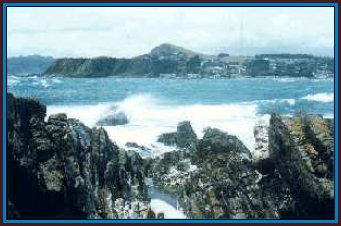
Russel also acted as the local kayaker's guardian, keeping a watchful eye - with his powerful vintage binoculars - from his Titahi Bay clifftop home for any overdue paddlers and meeting the paddlers on the beach after their long trips.
Sea Canoeist Newsletter No 60. January 1996 Conrad Edwards. Sea Canoeist Newsletter No 61. February - March 1996 ~ ~ ~ ~ ~ ~ ~ ~ ~ ~ ~ ~ ~ ~ ~ ~
For myself, the memories I cherish most of many are of cosy winter evenings at Russel's, chatting with him in front of the fire - armchair kayaking - perhaps with a glass of wine or a book of poetry, always with humour and friendship. I miss him.
In February 1992, Russel planned Cook Strait crossing from Titahi Bay to Cape Koamaru - at the tender age of 75 - with a friend in a motor sailer as an escort and a bottle of Glenfiddich in the kayak to celebrate a successful trip. The whisky bottle was a mistake, Russel noted, as he ended up in hospital. Worse still, the day planned for the crossing was perfect, neap tides, no wind, no sea and he was stuck in bed looking at a cloudless sky. During the 1995 Easter KASK Forum at Titahi Bay, Russel joined us for the paddle out to Mana Island, and later I felt guilty for growling at Russel for straying off our transit line back to the bay.
Russel had many dreams that will now not be realized; to continue his explorations of the Marlborough Sounds and other coasts, and to paddle across Cook Strait. Neither will the massive timbers in his back yard ever form the keel of his yacht. But his lately developed love of sea kayaking had probably superseded that dream, anyway.
Your friends do too.
Age: 79...Cancer
Youth is hot and bold Age is weak and cold
No doubt about that but weakness which is handicapped to a marked degree is much later in life than youth can imagine. So far as Sea-kayaking is involved it seems to me a gentle exercise which requires stamina rather than strength, 90% if not 100% of the time. Certainly a fit man 30 to 50 will get from A to B quicker than a fit man of 50 to 70.
Actually I think one begins to taper off between 65 to 70 but even so there's a lot of life left in the old bod past those years. As for the coldness, one way to keep warm is to get in the cockpit, with windproof jacket, do up the sprayskirt and set off.
Jack Frost - January 1996
Your friends do too. |
